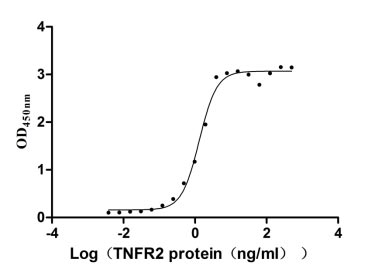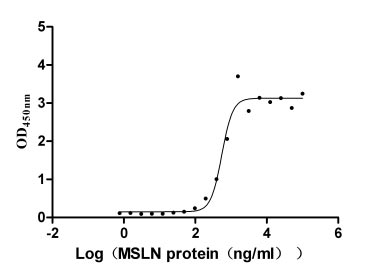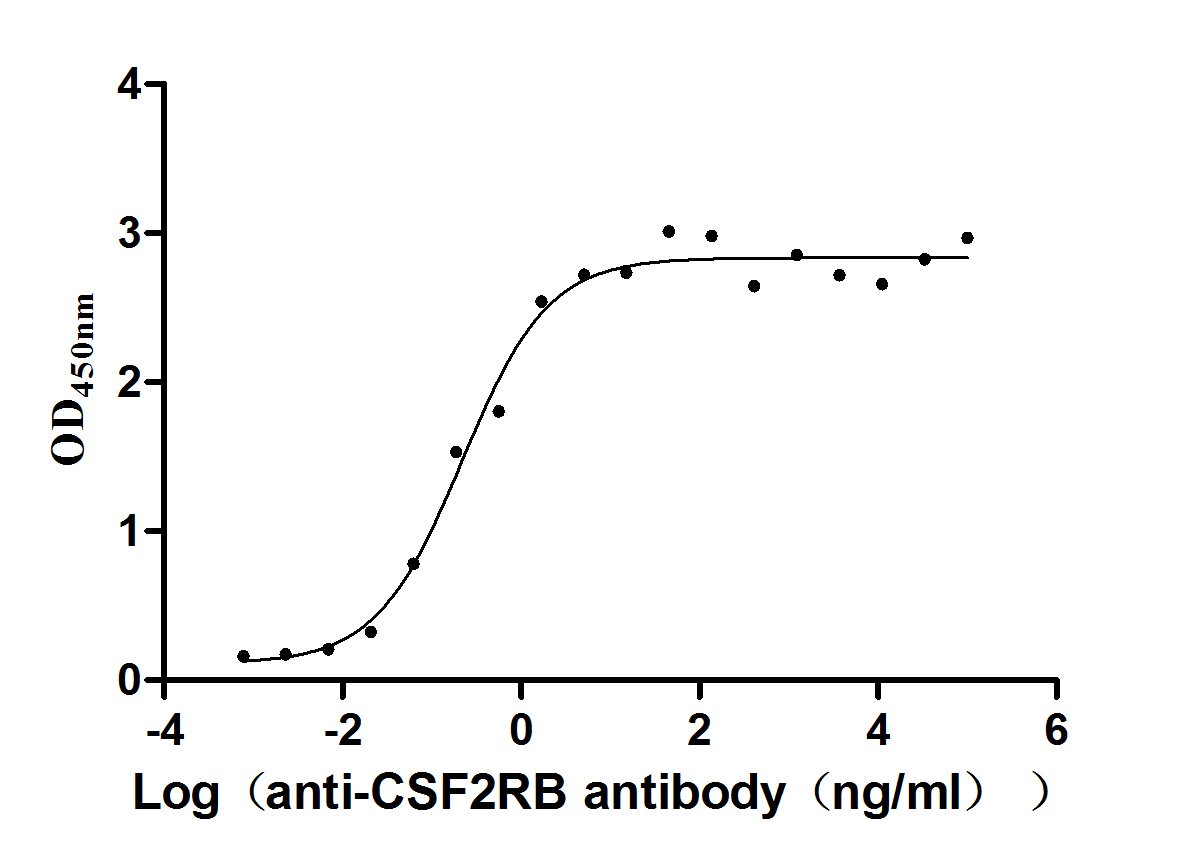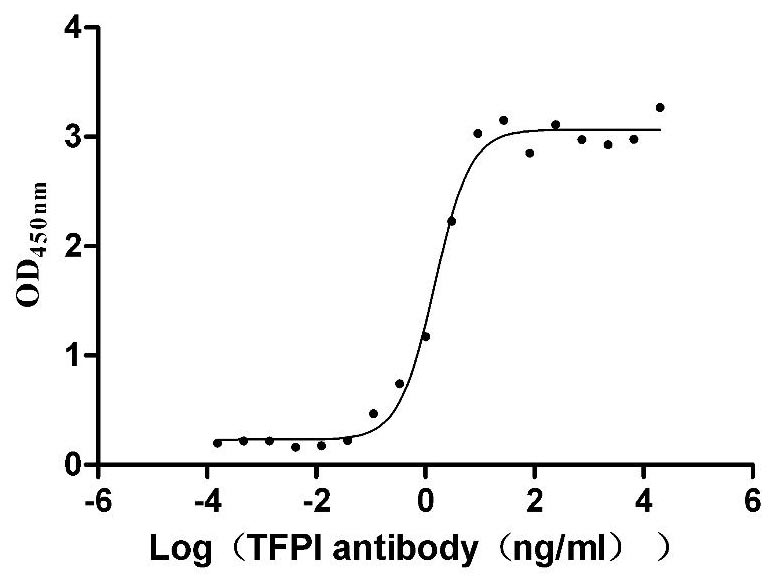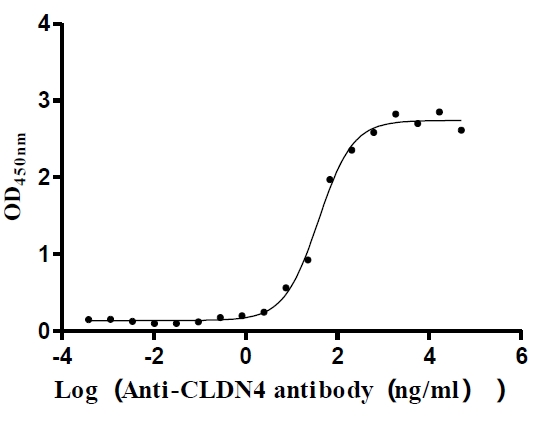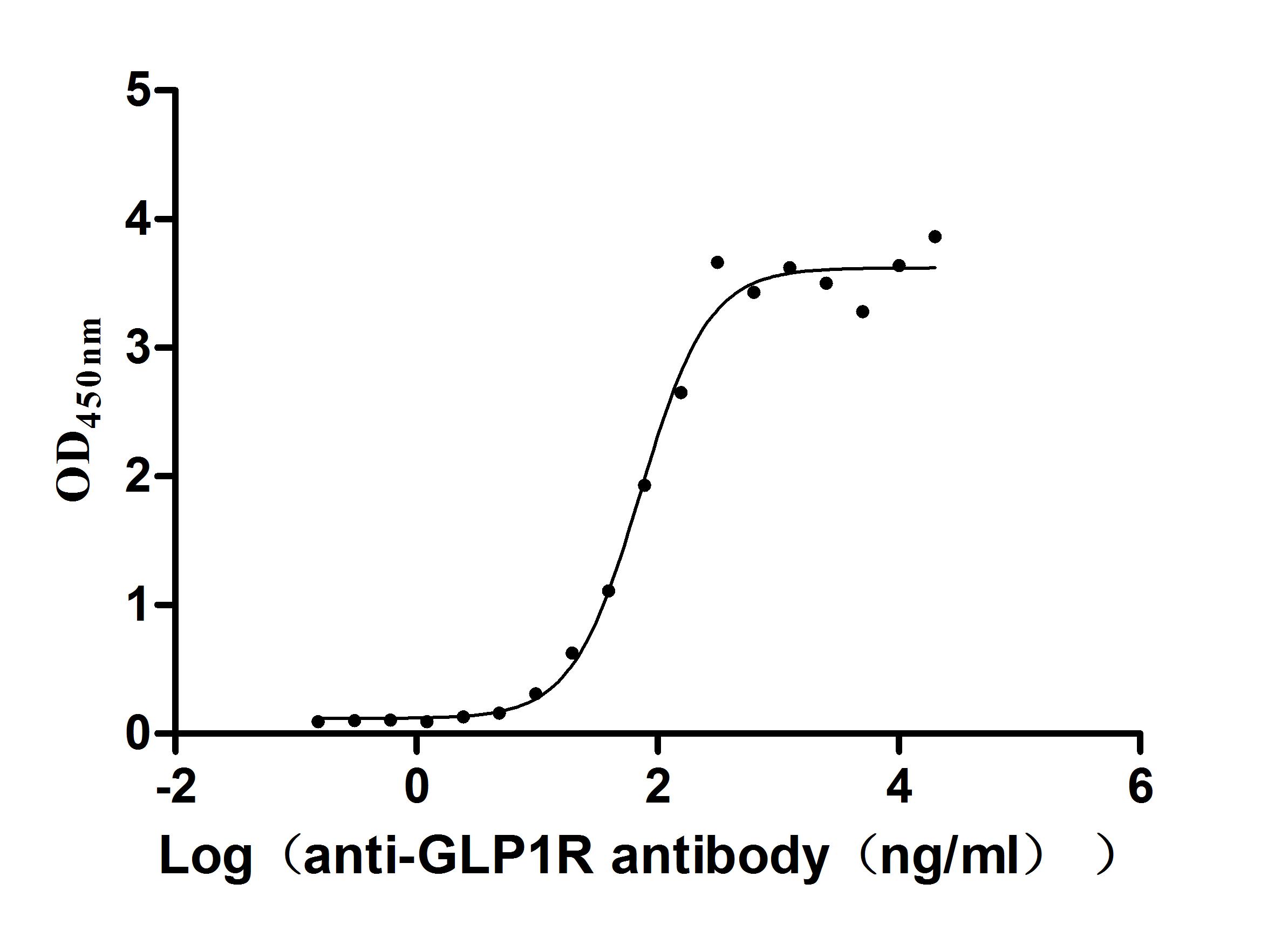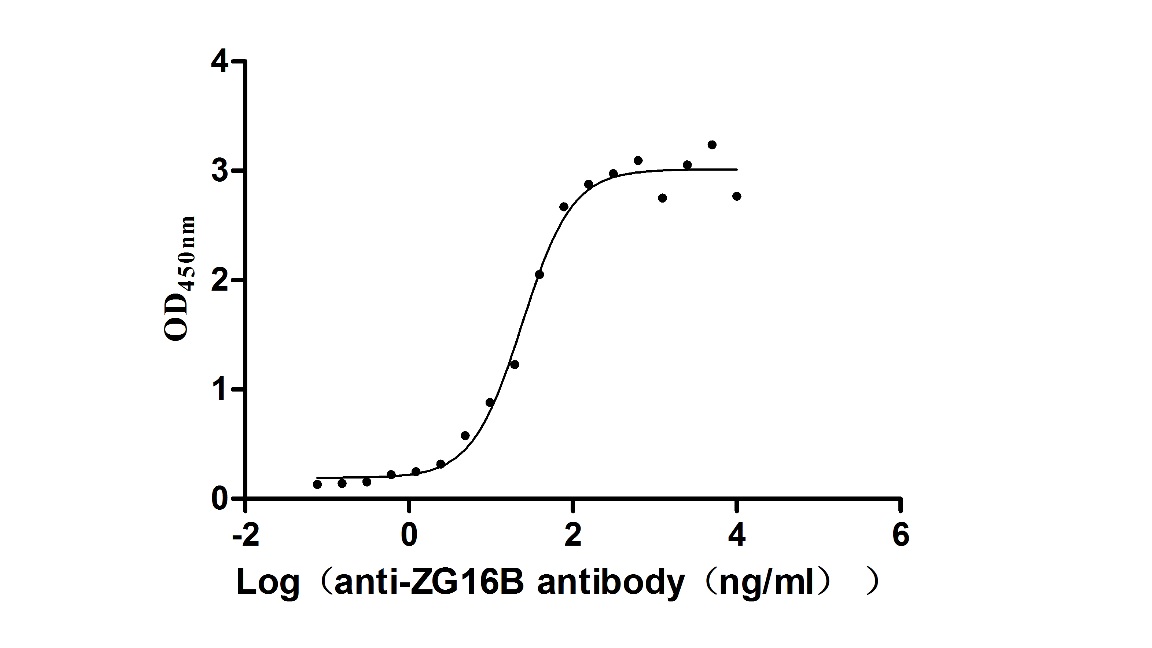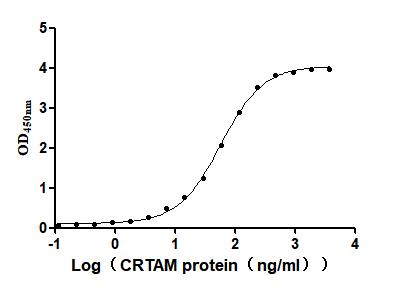Recombinant Human Ephrin type-A receptor 1 (EPHA1), partial
-
货号:CSB-YP007720HU
-
规格:
-
来源:Yeast
-
其他:
-
货号:CSB-EP007720HU
-
规格:
-
来源:E.coli
-
其他:
-
货号:CSB-EP007720HU-B
-
规格:
-
来源:E.coli
-
共轭:Avi-tag Biotinylated
E. coli biotin ligase (BirA) is highly specific in covalently attaching biotin to the 15 amino acid AviTag peptide. This recombinant protein was biotinylated in vivo by AviTag-BirA technology, which method is BriA catalyzes amide linkage between the biotin and the specific lysine of the AviTag.
-
其他:
-
货号:CSB-BP007720HU
-
规格:
-
来源:Baculovirus
-
其他:
-
货号:CSB-MP007720HU
-
规格:
-
来源:Mammalian cell
-
其他:
产品详情
-
纯度:>85% (SDS-PAGE)
-
基因名:EPHA1
-
Uniprot No.:
-
别名:EPH; EPH receptor A1; EPH tyrosine kinase 1; EPH tyrosine kinase; Epha1; EPHA1_HUMAN; Ephrin receptor Eph A1; Ephrin type A receptor 1; Ephrin type-A receptor 1; EPHT 1; EPHT; EPHT1; Erythropoietin producing hepatoma amplified sequence; Erythropoietin-producing hepatoma receptor; Esk; hEpha1; MGC163163; Oncogene EPH; Soluble EPHA1 variant 1; Soluble EPHA1 variant 2; Tyrosine protein kinase receptor EPH; Tyrosine-protein kinase receptor EPH
-
种属:Homo sapiens (Human)
-
蛋白长度:Partial
-
蛋白标签:Tag type will be determined during the manufacturing process.
The tag type will be determined during production process. If you have specified tag type, please tell us and we will develop the specified tag preferentially. -
产品提供形式:Lyophilized powder
Note: We will preferentially ship the format that we have in stock, however, if you have any special requirement for the format, please remark your requirement when placing the order, we will prepare according to your demand. -
复溶:We recommend that this vial be briefly centrifuged prior to opening to bring the contents to the bottom. Please reconstitute protein in deionized sterile water to a concentration of 0.1-1.0 mg/mL.We recommend to add 5-50% of glycerol (final concentration) and aliquot for long-term storage at -20℃/-80℃. Our default final concentration of glycerol is 50%. Customers could use it as reference.
-
储存条件:Store at -20°C/-80°C upon receipt, aliquoting is necessary for mutiple use. Avoid repeated freeze-thaw cycles.
-
保质期:The shelf life is related to many factors, storage state, buffer ingredients, storage temperature and the stability of the protein itself.
Generally, the shelf life of liquid form is 6 months at -20°C/-80°C. The shelf life of lyophilized form is 12 months at -20°C/-80°C. -
货期:Delivery time may differ from different purchasing way or location, please kindly consult your local distributors for specific delivery time.Note: All of our proteins are default shipped with normal blue ice packs, if you request to ship with dry ice, please communicate with us in advance and extra fees will be charged.
-
注意事项:Repeated freezing and thawing is not recommended. Store working aliquots at 4°C for up to one week.
-
Datasheet :Please contact us to get it.
相关产品
靶点详情
-
功能:Receptor tyrosine kinase which binds promiscuously membrane-bound ephrin-A family ligands residing on adjacent cells, leading to contact-dependent bidirectional signaling into neighboring cells. The signaling pathway downstream of the receptor is referred to as forward signaling while the signaling pathway downstream of the ephrin ligand is referred to as reverse signaling. Binds with a low affinity EFNA3 and EFNA4 and with a high affinity to EFNA1 which most probably constitutes its cognate/functional ligand. Upon activation by EFNA1 induces ce...显示更多
-
基因功能参考文献:
- EphA1 expression is decreased in ovarian serous carcinoma compared with normal fallopian tube and benign ovarian serous cystadenoma. Decreased EphA1 expression was more often detected in high-grade tumors. PMID: 29393455
- Results show that EPHA1 expression is up-regulated in ovarian cancer (OC) cells and provide evidence that it may promote the aggression of some OC cells. PMID: 28739735
- EPHA1 suppresses spreading and adhesion of HRT18 colorectal cancer cells through deactivation of ERK and JNK signaling pathways. PMID: 26977017
- Data indicate that EphA1 protein may be a new marker for the prognosis of clear cell renal cell carcinoma. PMID: 26261568
- High expression of EphA1 was associated with metastasis and recurrence in Gastric Cancer. PMID: 25391265
- This study suggests EPHA1 (rs11771145) interferes with the pathological alteration of the hippocampus and the lateral occipitotemporal and inferior temporal gyri throughout the Alzheimer's disease process, leading to a lower risk of Alzheimer's disease. PMID: 25182741
- EphrinA1 plays an important role in the TNF-alpha-mediated adhesion of monocytes to endothelial cells. PMID: 25451169
- Lack of ephrin receptor A1 is a favorable independent prognostic factor in clear cell renal cell carcinoma. PMID: 25025847
- two states of the EphA1 transmembrane helix dimer PMID: 25286141
- Suggest EphA1 receptor may have roles in carcinogenesis and progression of prostate cancer. PMID: 24040450
- High Eph A1 expression is associated with choriocarcinoma invasion. PMID: 23429488
- Results show that EphA1 appears to be a differentiation marker for esophageal squamous cells, and its increased expression is positively associated with lymph node metastasis and advanced disease stage. PMID: 23030051
- EphrinA1 is released in three forms from cancer cells by matrix metalloproteases PMID: 22688511
- The present study reveals a novel function for EphA1 and EphB2 in the induction of autophagy, suggesting a tumor suppressor role for these proteins in colorectal cancer. PMID: 21503576
- found independent evidence for association for Alzheimer's disease susceptibility loci at EPHA1, CD33 and CD2AP PMID: 21460840
- Common variants at MS4A4/MS4A6E, CD2AP, CD33 and EPHA1 are associated with late-onset Alzheimer's disease. PMID: 21460841
- The EphA1 expression level is a potential prognostic marker in gastric carcinoma, and may provide a novel target of therapy for gastric carcinoma. PMID: 21042754
- Eph-A1 staining intensity was significantly associated with tumor size and tumor histopathological stage in pancreatic ductal adenocarcinoma PMID: 19949912
- Suppression of EphA1 expression in Huh-7 cells reduced their outgrowth when inoculated in the subcutaneous space in the flank of nude mice, presumably through angiogenesis inhibition since microvessel density was found to be inhibited. PMID: 20043122
- EphA1 seems to be a marker of the differentiated normal epidermis and its downregulation in nonmelanoma skin cancer may contribute to carcinogenesis of these very frequent human tumors. PMID: 16862074
- I 12 acquired a higher affinity toward EphA2 with K(d) 18 nm and inhibited vascular endothelial growth factor-dependent angiogenic invasion in a Matrigel plug assay PMID: 18308734
- Results suggest that EphA1-receptor transmembrane domains contribute to the dimerization-mediated receptor activation. PMID: 18590698
- analysis of the spatial structure and pH-dependent conformational diversity of dimeric transmembrane domain of the receptor tyrosine kinase EphA1 PMID: 18728013
- In EphA1 null transgenic mice a possible role for EphA1 in tissue patterning and hormone-induced apoptotic processes is indicated. PMID: 18802966
- We report selective targeting of PC-3 cells with nanoshells conjugated to ephrinA I, a ligand for EphA2 receptor that is overexpressed on PC-3 cells. PMID: 18990944
- EphA1 may play different roles during the different stages of colorectal carcinoma progression. PMID: 19011600
- EphA1 regulates cell morphology and motility through the ILK-RhoA-ROCK pathway. PMID: 19118217
- Epigenetic silencing of EphA1 expression in colorectal cancer is correlated with poor survival. PMID: 19277044
收起更多
-
亚细胞定位:Cell membrane; Single-pass type I membrane protein.
-
蛋白家族:Protein kinase superfamily, Tyr protein kinase family, Ephrin receptor subfamily
-
组织特异性:Overexpressed in several carcinomas.
-
数据库链接:
HGNC: 3385
OMIM: 179610
KEGG: hsa:2041
STRING: 9606.ENSP00000275815
UniGene: Hs.89839


